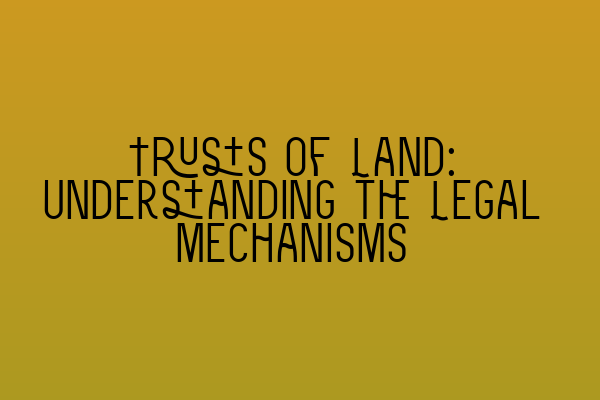Trusts of Land: Understanding the Legal Mechanisms
At SQE Property Law & Land Law, we understand that the legal landscape can be complex and confusing for both professionals and clients alike. One area that often raises questions and requires a thorough understanding is Trusts of Land. In this blog post, we will delve into the legal mechanisms of Trusts of Land, explain how they work, and discuss their significance in property law.
Before we dive into the intricacies of Trusts of Land, let’s first define what a trust is. A trust is a legal arrangement where one party holds assets on behalf of another party. The party holding the assets is known as the trustee, while the party for whom the assets are held is called the beneficiary. Trusts can be established for various purposes, including property ownership, asset protection, and estate planning.
When it comes to Trusts of Land, we are specifically concerned with trusts that hold property. These types of trusts are commonly used in situations where multiple individuals have a shared interest in a property, such as co-ownership or investment properties. Trusts of Land provide a legal framework for managing property interests and ensuring that the rights of all parties involved are protected.
There are two main types of Trusts of Land: express trusts and implied trusts. Express trusts are created through a formal legal document, such as a trust deed or a will. These documents explicitly state the intention to create a trust and outline the roles and responsibilities of the parties involved. On the other hand, implied trusts, as the name suggests, are not created through a formal document but are implied by the actions and conduct of the parties.
Express trusts can be further categorised into two subtypes: fixed trusts and discretionary trusts. In a fixed trust, the beneficial interests in the property are predetermined and cannot be changed without the consent of all parties involved. In contrast, discretionary trusts provide flexibility in distributing the beneficial interests, allowing the trustee to exercise discretion when allocating shares of the property to the beneficiaries.
Now that we have a basic understanding of the different types of Trusts of Land, let’s explore their legal mechanisms in more detail. One key concept in Trusts of Land is the concept of equitable ownership. Equitable ownership refers to the division of legal and beneficial ownership in a property. While the legal title of the property rests with the trustee, the beneficial ownership belongs to the beneficiaries. This division allows for the protection of the interests of all parties involved and ensures that the property is managed and used in accordance with the trust’s objectives.
Another important aspect of Trusts of Land is the trustees’ duties and powers. Trustees have a fiduciary duty to act in the best interests of the beneficiaries and to manage the property with skill and care. They must prudently administer the trust, exercise their powers responsibly, and avoid any conflicts of interest. Trustees also have the power to make decisions regarding the property, such as selling or leasing it, as long as these decisions align with the trust’s objectives and the beneficiaries’ interests.
In some cases, disputes may arise within Trusts of Land. These disputes can be related to disagreements over the management of the property, the allocation of beneficial interests, or the sale of the property. When such disputes occur, it is essential to seek legal advice from professionals who specialize in property law and Trusts of Land. At SQE Property Law & Land Law, our experienced solicitors can provide expert guidance and representation to help resolve disputes and protect your rights as a beneficiary or trustee.
In conclusion, Trusts of Land play a crucial role in property law, particularly in situations where multiple parties have a shared interest in a property. Trusts of Land provide a legal framework for managing property interests and ensuring that the rights of all parties involved are protected. By understanding the legal mechanisms of Trusts of Land, you can navigate these complex arrangements with confidence and make informed decisions regarding your property rights. If you need assistance with Trusts of Land or any other property law matter, contact SQE Property Law & Land Law today.
Related Articles:
– SQE 1 Practice Exam Questions
– SQE 1 Practice Mocks FLK1 FLK2
– SQE 2 Preparation Courses
– SQE 1 Preparation Courses
– SRA SQE Exam Dates
